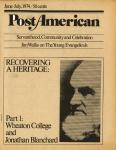Now, the ideal solution to this problem is to know a brother or sister in your area who is a lawyer. Not everyone is afforded this luxury, which is why I’m writing this column.
First of all, it’s important to know when you require legal assistance. It’s essential to have a lawyer if you are arrested for an alleged crime, even if it isn’t serious. If someone files suit against you or if you are involved in an injury or property damage claim, you’ll need a lawyer’s counsel. Also, when you sign a contract, deed, will, or other sort of legal paper, or when you buy or sell real estate, you’ll find a lawyer is important.
If you have lots of money, finding a lawyer you can afford isn’t a problem. Your local bar association should have a lawyer referral service. If you are poor you’ll have to look to your neighborhood Legal Aid Society. Check your phone book for the nearest office or call your county bar association. These offices take civil cases only (no criminal cases), and you must be genuinely poor to qualify for such aid. Also, if your case goes to court, you may have to pay the court fees. If they can’t help you, they may be able to refer you to someone else who can. Catholic Charities also has a legal aid program.
If, through the phone book you aren’t able to locate any legal aid clinics, there are two directories that may help you. They are: Directory of Legal Aid and Advice Throughout the World (published by the International Legal Aid Association) and the Legal Aid Directory (published by the National Legal Aid and Defender Association). These directories may be found in the reference section of large public libraries or in university libraries.
Speaking of universities--many law schools have legal clinics in which advice is offered by law students. If you live in an urban area especially, this is worth investigating.
One thing that may keep you out of trouble--read everything that you sign, such as leases, loans, or agreements for paying on installments. Sure it’s a hassle, but read the fine print. You’ll know what responsibilities you have and what rights you can expect.
When this article appeared, Etta L. Worthington was on the editorial staff of the Post American.

Got something to say about what you're reading? We value your feedback!
